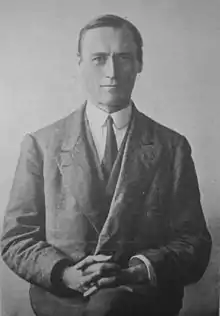Pierre Cérésole
Pierre Cérésole (17 August 1879 – 23 October 1945) was a Swiss peace activist and engineer, known primarily as the founder of the Service Civil International (SCI) in 1920, an organisation that helped in reconstruction after the First World War with the goal of achieving an atmosphere of brotherhood.
| Pierre Cérésole | |
|---|---|
 | |
| Died | Lutry |
| Signature | |
Life
Pierre Cérésole was born in Lausanne on 17 August 1879, the son of Paul Cérésole, a member of the Swiss Federal Council and a President of the Swiss Confederation.
As a pacifist, he refused to pay taxes that were used for the acquisition of arms and refused to accept money from his inheritance during World War I. He spent many hours in prison because of that.
In 1931, Ceresole met Mahatma Gandhi in Lausanne, while he was staying in Romain Rolland's house in Geneva after having taken part in the Round Table Conferences in London. Ceresole was inspired by Gandhi's thinking, but also disagreed with parts of his non-cooperation approach. While they agreed on refusing to support any military activity by any government, Ceresole was ready to cooperate with governments no matter their ideology on other grounds.[1]
In November 1933, Ceresole crossed the border between Switzerland and Germany in order to meet Adolf Hitler to inquire about the situation in Germany, although the meeting did not take place.[1]
Cérésole had been inspired by American thinker William James. Cérésole in turn inspired Kees Boeke.
After Cérésole's death, his friend and peace activist, Hélène Monastier, published his biography and several of his papers.[2]
Recognition
Ceresole was nominated for the Nobel Peace Prize in 1938 and 1939.[3]
Bibliography
- Cérésole, Pierre (1950). Vivre sa vérité Carnets de route 1909-1944. Neuchâtel: La Baconnière. p. 279 p.
- Cérésole, Pierre (1954). For peace and truth: from the note-books of Pierre Ceresole. Translated by John W. Harvey; Christina Yates. Bannisdale Press. p. 192 p.
- Monastier, Hélène (1947). Un Quaker d'aujourd'hui: Pierre Cérésole. Paris. p. 43 p.
- Monastier, Hélène (1960). Pierre Cérésole d'après sa correspondance. Neuchâtel: La Baconnière. p. 249 p.
- Maddock, Keith (2005). Living truth: a spiritual portrait of Pierre Ceresole. Pendle Hill pamphlets #379. Wallingford: Pendle Hill. p. 35 p. ISSN 0031-4250.
See also
Sources
- Claus Bernet (2005). "Pierre Cérésole". In Bautz, Traugott (ed.). Biographisch-Bibliographisches Kirchenlexikon (BBKL) (in German). 24. Nordhausen: Bautz. cols. 432–443. ISBN 3-88309-247-9.
- Pierre Cérésole in German, French and Italian in the online Historical Dictionary of Switzerland.
| Wikimedia Commons has media related to Pierre Cérésole. |
References
- Marcussen, Eleonor (2018). Cooperation and Pacifism in a Colonial Context: Service Civil International and Work Camps in Bihar, 1934–1937 (PDF).
- "Pierre Ceresole. A lifetime serving Peace" (PDF).
- "Nomination%20Archive". NobelPrize.org. 2020-04-01. Retrieved 2020-08-29.